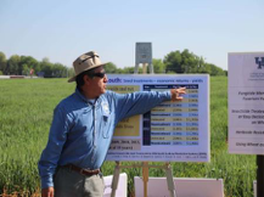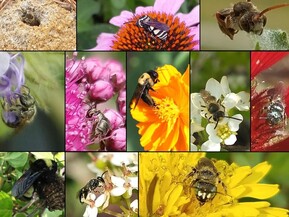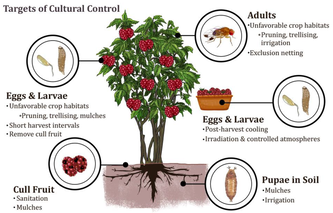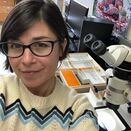 Fig. 1 Dr. Villanueva presenting at an extension field event. Fig. 1 Dr. Villanueva presenting at an extension field event. Written by: Maria Cramer and Veronica Yurchak In academia it’s fairly common to become an expert in a tiny slice of science. Researchers often become incredibly familiar with the particular system or organism they study and may not have too many reasons to branch out. That is not the pattern that Dr. Raul Villanueva, from the University of Kentucky, followed, however. Dr. Villanueva, the field crops entomologist for Kentucky, attributes his diversity of study areas to working in agricultural extension. In order to help support and educate Kentucky farmers he ends up working on whatever insect problems they are facing. And what’s more, Kentucky is a state of diverse agricultural production, ranging from grain crops like wheat, corn, and soybeans, to hemp for CBD production, sweet sorghum for molasses, and many horticultural crops like fruits and vegetables. Over the course of the seminar talk that he presented to the University of Maryland Entomology Department, Dr. Villanueva took the audience on a journey through his extension research program. Museum Scholarship and Material Culture Program spotlights Jayd's research and efforts in DEI3/25/2021
Congrats team Checkerspots - Maggie Lewis, Taís Ribeiro, Maria Cramer, and Kristin Jayd- for scoring 2nd place in the entomology Games at the Entomological Society of America's Eastern Branch meeting! This fall University of Maryland Checkerspots are headed to Denver, where they will compete at the national level. Go Checkerspots!!!!!
Assessing patterns of genetic diversity and structure of foundation species helps researchers better understand population dynamics in order to establish effective conservation strategies. Postdoc Magdalene Ngeve, Neel Lab, collaborated on an extensive study on the mangrove species Rhizophora mucronata in the Western Indian Ocean. Findings of that study were published in Scientific Reports earlier this month: “Expansion of the mangrove species Rhizophora mucronata in the Western Indian Ocean launched contrasting genetic patterns.” The authors hope their findings will, one day, be integrated with other regional genetic data to further understand the connectivity of mangroves at a global scale.
written by: Angela Saenz and Eva Perry
On February 12th (2021), Dr. Zoe Getman-Pickering, who obtained her Ph.D. from Cornell University in 2020 and is currently a postdoctoral scientist working at George Washington University with John Lill, spoke in the Entomology Colloquium series about her research related to the tri-trophic interactions between plants, herbivorous insects, and arbuscular mycorrhizal fungi (referred to as mycorrhizal fungi, or mycorrhizae, hereafter). She described her work on the relationship between plants and mycorrhizal fungi, and the biotic and abiotic factors influencing this relationship.  Measuring and comparing biodiversity is challenging because rare species are often undetected. So, what can researchers do to address these sampling issues in biodiversity measurement? Michael Roswell, Postdoc in Espindola Lab, and colleagues have a new paper out in Oikos that recommends using two tools in tandem -coverage and Hill diversity. Join us in congratulating Michael on this recent pub entitled, “A conceptual guide to measuring species diversity,” "Editor's Choice" of the March issue in Oikos, and now one of the most downloaded Oikos articles from the past 2 years.  Photo Credit: Naiade Caparelli Photo Credit: Naiade Caparelli Hamby Lab has a new paper out in Insects that describes the current use of cultural controls in the management of the invasive spotted-wing drosophila (SWD), a small insect that causes big problems for fruit crops. Paper entitled, “Cultural Control of Drosophila suzukii in Small Fruit—Current and Pending Tactics in the U.S.” In this paper first authors, Torsten Schöneberg (Postdoc) and Margaret Lewis (PhD student), explain cultural controls as a pest management technique that modifies production practices and the crop environment to reduce pest populations and damage. By reporting on the approaches and effectiveness of various cultural controls for SWD management, from pruning to irrigation methods, the authors hope to further encourage fruit growers to adopt these techniques as an alternative to pesticide use. Please share with your networks: twitter, facebook |
Categories
All
Archives
June 2024
|
Department of Entomology
University of Maryland
4112 Plant Sciences Building
College Park, MD 20742-4454
USA
Telephone: 301.405.3911
Fax: 301.314.9290
University of Maryland
4112 Plant Sciences Building
College Park, MD 20742-4454
USA
Telephone: 301.405.3911
Fax: 301.314.9290


 RSS Feed
RSS Feed




